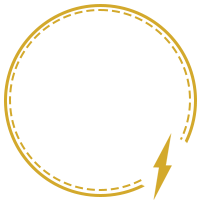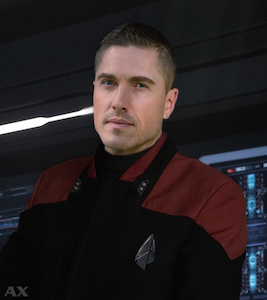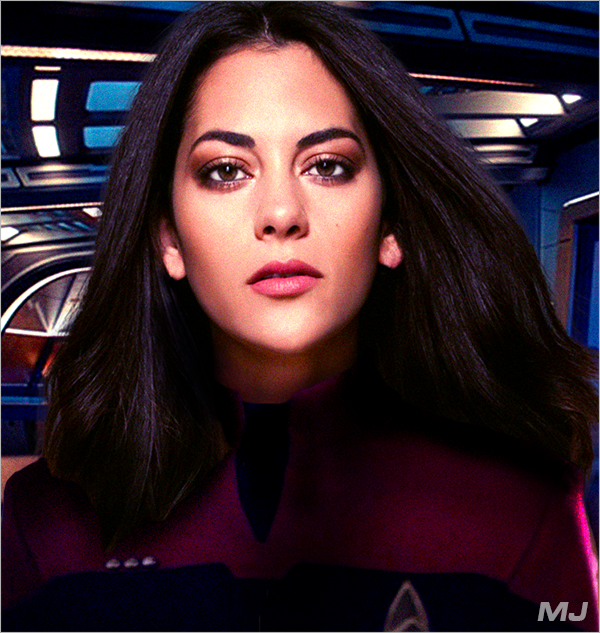Commander Forrest was a few steps behind the captain as they made their way onto the bridge. The swing shift crew were already being relieved at their posts by senior officers, with instructions coming quietly and calmly despite having been thrown around the room just a few moments prior. As jarring as being pulled out of warp had been, the crew were still professionals, and he knew he could count on them to do their jobs without letting this rattle them.
“Damage and casualty report!” Captain Armstrong ordered as he took the center seat.
“No major damage detected just some minor repairs needed, which are already being taken care of,” Natalya replied.
“No casualties.” The CMO added. “Just bumps, bruises and the occasional sprain.”
“That’s a relief,” the captain said, with a small sigh. “Helm, make sure we’re at station-keeping. No telling whether whatever hit us–or whatever we hit–is still out there or not,” he ordered.
“Helm answering all stop, aye,” Willow announced with barely a flourish of fingers on keys, seeing as how the ship had been pretty well stopped. She’d taken over from the even fresher-faced Ensign who had nabbed the evening slot, now making themselves scarce against a wall, but not leaving just in case they found themselves needed. “Zero relative motion with nearby galactic structures.”
“Are there any ships or structures on sensors?”
After she said ‘thank you’ to the one who was at the Ops station and briefed her on what she needed to know earlier, she had been sitting there running a full sensor sweep in anticipation of the order. Mainly due to curiosity on her part, as she will certainly have to have her team assist Engineering with any damage. That is, if there was any, Akira remembered hearing that there was no damage. This made her frown, becoming more and more curious, especially when the sensor report came up nothing. She turned her seat to look at the Captain and the Commander, the frustration of her Klingon half and the confusion of her human half-covering her face. “Nothing.” She then corrected herself. “Sensors do not detect anything, sir. Nothing in close proximity and nothing on the short-range band either. Sir, it’s just empty space.”
Having only come in moments before, Eddie made his way to the Science station, a lone crewman still manning the console. After collecting his small report, Eddie activated the console, which started collecting the same sensor scans that had already been taken. Eddie was still a bit aloof, having slammed his head into a table only minutes before in one of his science labs. He confirmed the report. “I’m not seeing anything either. Sensors are blank in the immediate area.” Eddie was confused. What did they hit?
“Stand down to yellow alert for the time being.”
“Sir, is that–,” Forrest started in a low tone, but abandoned his objection at Armstrong’s stern glance. The younger man cleared his throat. “Tactical, continue long-range scans for any threats,” he said, instead.
Kiran stood at the tactical station. His eyes focused on the readings from his screen. He looked up and at Commander Forrest “Yes sir” he said in a crisp response.
“Alright, we’re stopped and we’re intact. Can someone now please tell me what the hell happened?” Armstrong asked, standing up from his seat and looking around the bridge at his still-new staff.
Forrest flipped through the display modes on his console, examining the various sensor bands but seeing absolutely no explanation for how they could have come into contact with an energy field this far out into open space. He wasn’t a science officer–his background was in flight control–but he did see something familiar on the gravitational sensors. That familiarity did not immediately translate into an actionable clue, though, and his brow furrowed as he looked at the data.
“Speak up, Commander,” Armstrong said, sharply.
“Sorry, sir,” Forrest offered. “It’s just that the readings from the gravimetric sensors are somehow familiar, and I can’t quite place where I’ve seen them before.”
When Akira heard that, she scrolled through the sensor bands until she reached the gravimetric sensors and ran a full diagnostic. When no issues came up, she ran the system for data for analysis and when the results came up, she took a deep breath to relax her Klingon half that was about to throw a temper tantrum at what didn’t make sense. But the confused look on her face remained, as she turned in her seat to look at the Captain and Commander once more.
“I just ran the data and a full diagnostic. The system is telling me that we are very much on the edge of a gravity well, seventy or eighty AUs from a G-type star. But that doesn’t make any sense! There’s nothing there!” She slipped and then turned in her seat to hide her face from the rest and stared at her data.
“Helm confirms,” Willow announced. “No immediate action required. But can confirm gravitational influence. Nothing to worry about for another couple of decades, but it would explain dropping out of warp if we ran closer to the source and upset the warp field because we couldn’t account for it.”
“Calm yourself, Lieutenant Rowe,” Armstrong ordered, returning to the center seat and examining the data on his armrest screen. “Commander Price, confirm these readings through the Starfleet Astrometrics database. If there is a star here, its gravity should be impacting nearby objects.”
“Aye, sir. Give me a couple hours and I’ll have an answer for you.” The captain was certainly right that a star would have an impact on the surrounding space. He started the search process, manually scanning while they computer did its work.
“In the meantime, we have to assume that our readings are accurate. We’ve struck an energy field at the edge of what appears to be a hidden star system, smack dab in the middle of Federation space,” the captain summarized.
“Projecting any energy field, let alone a cloaking field, that’s 160 AUs wide would require an enormous amount of energy. Whatever’s going on here is far beyond Federation technology,” Forrest pointed out.
“All the more reason for us to figure out what’s behind that field,” Captain Armstrong replied. “Let’s see if we can at least get a sense of what we’re dealing with. Engineering, configure the main deflector to emit a tachyon pulse. If this is like any other cloaking field, we should at least be able to reveal its shape.”
Natalya stood at the main engineering console on the bridge and quickly did as the Captain requested. A few moments after some quick inputs into the console she looked up from the console “Tachyon pulse configuration complete, sir.”
“Rowe, activate the pulse,” Amstrong ordered.
Akira finished taking a few deep breathes and intertwined her fingers together to crack her knuckles. Now that she felt better, she watched the magic button appear for her before she went to press it to activate the pulse. Once the pulse was fired, she brought up the displays normally needed for charting and scanning an entire star system. She wanted to be prepared for the work load.
The bridge crew watched as the blue pulse of energy appeared on the viewscreen, coherent in a sphere for just a few seconds before it contacted the invisible barrier. For a brief moment, the rest of the screen lit up blue. The tachyon pulse had revealed what appeared to be a flat wall, but what from further out would appear as a sphere encompassing an entire solar system, before the screen went dark again. All of the bridge stations were pulling in a tremendous amount of information, and the crew poured over it.
“Well, I suppose that’s all we can do for the moment. I want reports from all departments in the briefing room in an hour,” Armstrong said, standing up from his chair.
Nearly as soon as the captain had left his seat, the ship was hit with a massive blast of energy from behind the cloaking shield. The computer immediately took them to red alert, as Captain Armstrong was thrown off his feet, along with anyone else standing on the bridge. Forrest shot up to help Armstrong back into his chair, a line of blood was coming from his temple, but he was at least conscious. The ship rocked again as it passed through the energy barrier entirely, the transition rippling across the screen.
“Report!” Forrest shouted over the klaxons.
After getting back to her feet from the sudden blast Natalya shook off the blurry vision and looked at the engineering console. The news was less than stellar and she didn’t quite know what happened. “Captain, our shields, weapons, and engines are all offline. Whatever that blast was it has crippled us.”
She grimaced knowing this was not good news and immediately sent the orders for her teams to begin diagnostics to see what the issue was.
Kiran made his way back to his feet and ran his forearm across his head before looking at the Commander, “We were hit by a high powered energy beam, it is of unknown origin at this time sir” he said his breath a little shaky as his mind ran through everything he knew about the lat few minutes.
“Helm is not responding,” Willow added, though somewhat superfluous with the announcement of the engines being offline. “We’re in free fall?” she asked more than stated as she examined her console. “32 hours till we hit the center of that gravitational field at current velocity. We’ve got RCS, but nowhere near enough delta-v to try and push for an orbit.” Willow tapped away a few more commands on her screen then turned to face the command chairs. “Sorry, sir, without the subspace driver coils, we’re a fancy brick.”
While everyone has tried to scream their reports over the loud klaxons, she was in the system to shut off the noise. They already know that they’re in trouble, and a dozen klaxons later, the entire crew also know that they are in trouble. So why is the sound still screaming in her ears? With a couple more commands entered, the sound was muted and she relaxed with a sigh. Only for a brief since she remembered that they were headed directly for the sun. With the sensors clearly working, Akira ran diagnostics on key systems.
“Engineering, get me my engines back online!” Captain Armstrong ordered, hissing from obvious pain.
“Captain, you need to get to sickbay,” Forrest insisted, watching with concern as the captain contorted in pain.
There was no way of knowing how hard he’d hit, but even a non-physician like Forrest knew that it wasn’t wise to mess around with traumatic brain engineers. The captain grimaced and shook his head.
“Stabilize the ship and figure out where we are, Number One,” Armstrong ordered, pushing himself up out of his seat with obvious difficulty. Forrest rose to stabilize him until Dr. Young could get him from the other side. “Ready room, Doctor,” the captain said, moving with renewed strength not towards the turbolift but to his ready room on the port side of the bridge.
Forrest moved over to the center seat. “I want options people,” he ordered. “We’re not crashing into a star on our first mission.”
As Forrest took command, the Columbia continued to soar towards the center of the unknown system. Windows across half the ship were flashing as internal lighting still reeled from the surge, and plasma poured from the emergency flush vents on the warp nacelles, as the computer did what it could to avoid a catastrophic containment failure. For all the problems onboard, though, the proximity sensors began to pick up hundreds of thousands of contacts throughout the system.

 Bravo Fleet
Bravo Fleet

















